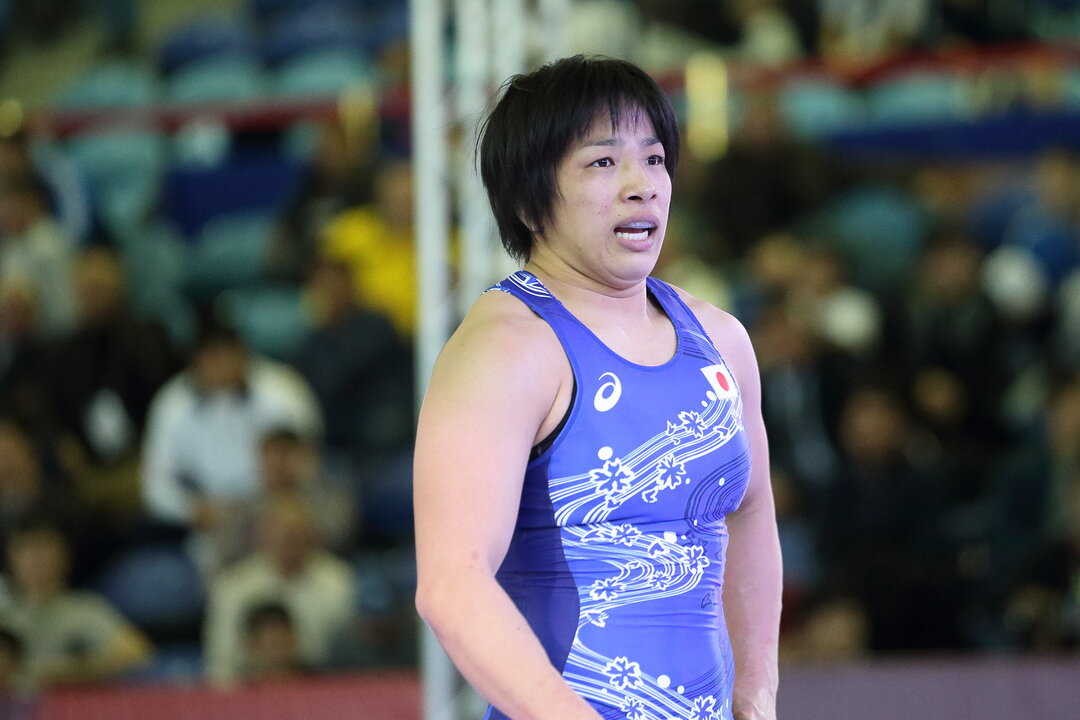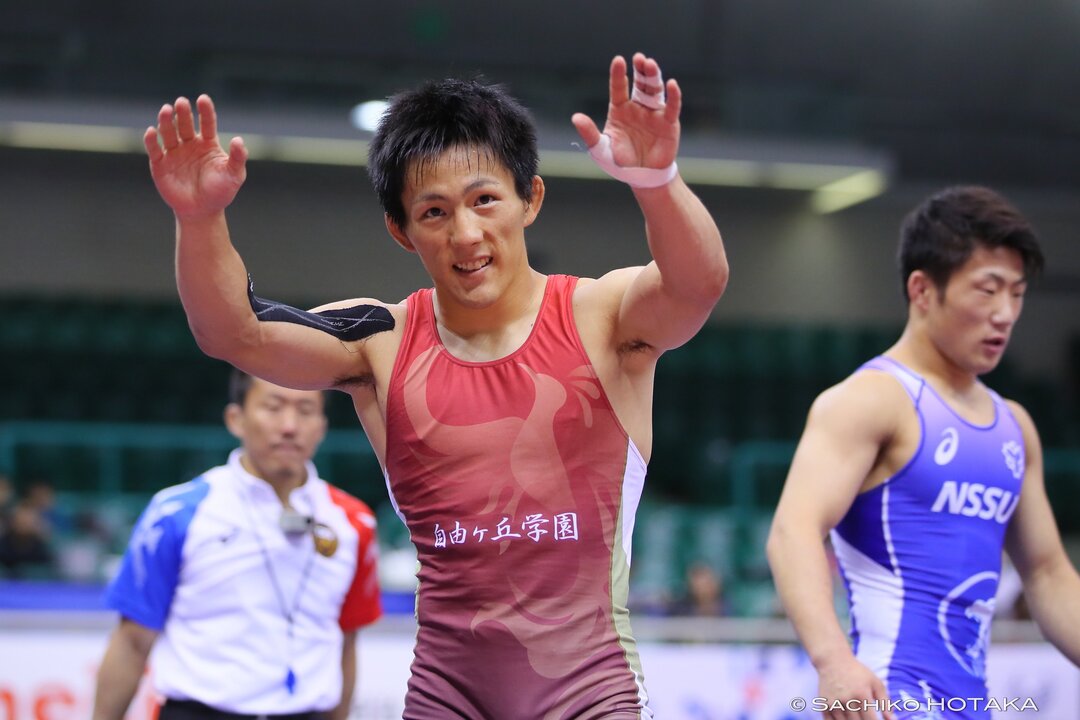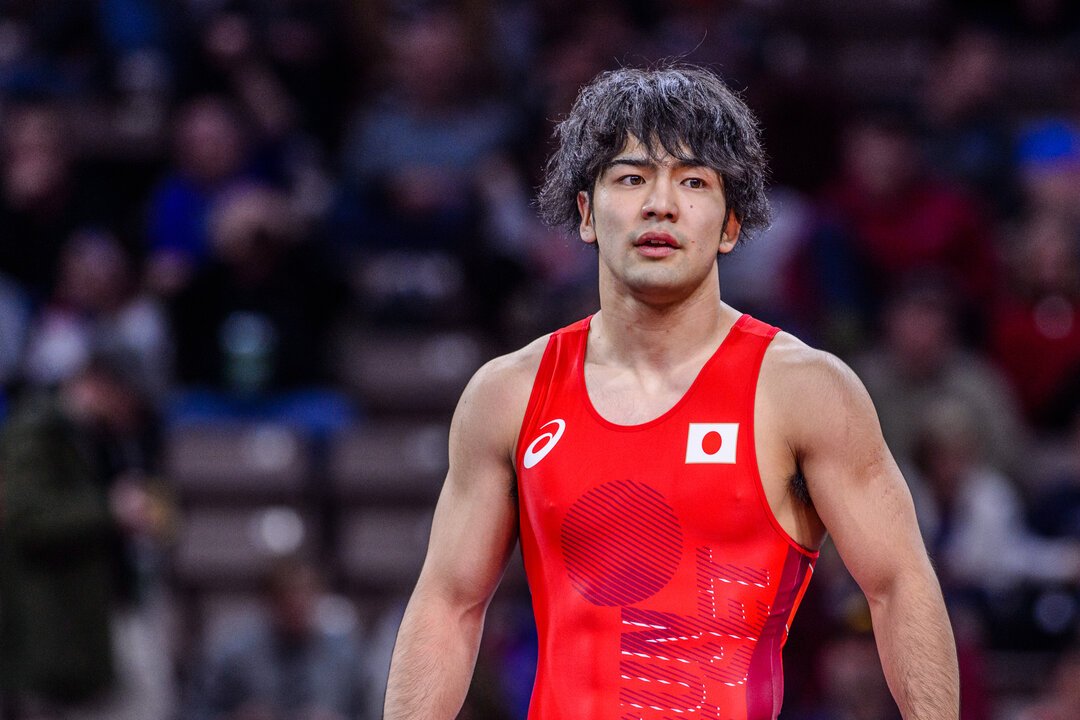Motoki emerges at next potential star by filling Japan's opening at women's 59kg
Thursday, June 16, 2022 - 14:44 By Ken Marantz

TOKYO (June 16)--After the 2021 world silver medalist retired, Sara NATAMI stepped up and appeared to fill Japan's hole at women's 59kg by winning the gold at the Asian Championships in April. Just two months later, she's out, and a potential new star has emerged for the preeminent powerhouse.
Sakura MOTOKI, who had only recently returned after undergoing knee surgery just under a year ago, demolished Natami in the final of the Meiji Cup All-Japan Invitational Championships on Thursday, then returned to the mat to beat her again for a spot on Japan's team to this year's World Championships.
"Coming up to this, I had an injury, I couldn't enter the All-Japan Championships, I had tournaments canceled by the coronavirus," Motoki said. "So many things happened, but because of the support of so many people, I was able to make it this point, so I'm really happy."
The 20-year-old Motoki, a 2017 world U17 champion whose father competed in Greco-Roman at the 2000 Sydney Olympics, put on a takedown exhibition in storming to a 10-3 victory over Natami in the final on the opening day of the four-day tournament at Tokyo's Komasawa Gym.
Natami put up a stiff defense to thwart Motoki's attacks in the world team playoff, but that kept her from making any offensive overtures of her own and the aggressive Motoki won 2-1 with all of the points scored on the activity clock.
The tournament is the second of the two domestic qualifiers for this year's World Championships, along with the Emperor's Cup All-Japan Championships that were held last December. Winners of both tournaments earn an automatic ticket to Belgrade; if the champions are different, the two meet in a playoff at the end of that day's action.

The wrestle-off at 59kg between Motoki and Emperor's Cup champion Natami was one of three in the eight weight classes in action on Thursday.
Motoki's Ikuei University teammate Ami ISHII will be joining her on the flight to Belgrade after winning the title and playoff at 68kg--and after first beating world silver medalist Rin MIYAJI in the semifinals. Miyaji was competing for the first time since the 2021 World Championships, where she suffered a severe knee injury in the final.
Natami had won six consecutive tournaments dating back to the Japan Women's Open in October 2019 and was fresh off her triumph at the Asian Championships in Ulaanbaatar. She won her first two matches by technical falls, but was no match for the aggressive Motoki, who prepped for the tournament by winning the U20 title at the Junior Queens Cup in April--her first tournament in 10 months.
Motoki said she felt rusty in her first two matches--a fall and a 4-0 victory--but made the necessary adjustments for the final.
"My movement in the quarterfinal and semifinal was as bad as it gets, so before the final, I talked with coach [Yoshimaro] YANAGAWA and we looked at what to fix," she said. "In the final, I was able to do what I have always worked on in practice, so that was good."
Motoki used the time away from the mat to watch videos of some of the sport's top stars. She said that among those whose techniques she studied were compatriots Akari FUJINAMI and Rei HIGUCHI, as well as former world champion and constant blur of action Haji ALIEV (AZE).
"When I couldn't wrestle, I used that time to watch many videos of wrestlers with excellent technique," said Motoki, who executed a textbook-perfect duck under against Natami. "It made me think of what was the ideal type of wrestling I want to do. When I came back, I felt I was physically better than before I was injured, and I had had better techique and was a better wrestler."
While all conversations in Japan eventually shift to which Olympic weight class a wrestler will move into, Motoki is content for now to stay in the non-Olympic weight, albeit with eyes on the 2024 Paris Olympics.
"At this point, I don't have the confidence to compete in an Olympic weight class," Motoki said. "To win the title here, then win the title at the World Championships, will give me confidence, and then I'll decide if I want to go up or down."
Motoki, who started wrestling at age 3 in Saitama Prefecture, north of Tokyo, and attended powerful Saitama Sakae High School, said her parents encouraged her during the depressing times of her injury, and that her father Yasutoshi, who placed ninth at Greco 63kg at Sydney 2000, is always offering wise advice.
"He said to not make excuses for not doing things," Motoki said. "Like 'Today, I'm wrestling poorly, so I'll stop practicing.' He would always tell me, don't look for a reason to avoid doing something."
Japan got a silver medal at 59kg at the 2021 World Championships from Akie HANAI, who has since retired.

At 68kg, Ishii, the 2020 Klippan Lady Open champion at 65kg, scored a first-period takedown in the final and held on for a 2-1 victory over Emperor's Cup champion Naruha MATSUYUKI. The playoff was a virtual repeat, with Ishii again winning 2-1 with a first-period takedown.
Ikuei University, which was only founded in 2018, could place a third member on the team to Belgrade if Tsugumi SAKURAI, the world 55kg champion, can win the title at 57kg on Friday.
Earlier Thursday, Miyaji fell victim to her own sloppiness and lost 9-6 to Ishii in the semifinals. She came back to win the bronze-medal match by fall over Kumi KOBAYASHI.
"I won the third-place match, but I practiced with the goal of winning the championship, so it's disappointing to finish third," said Miyaji, a junior at Nippon Sports Science University where she is coached by Olympic legend Kaori ICHO.
Miyaji had caught the world's attention at last year's World Championships in Nur-Sultan when she posted a stunning victory by fall over Tokyo Olympic champion Tamyra STOCK MENSAH (USA). But in the final against Meerim ZHUMANAZAROVA (KGZ), she had her knee violently twisted outward--some wonder why the match wasn't stopped with Miyaji's knee in an obviously dangerous position--and lost by fall.
"I feel like there is a gap between the results I have achieved and my actual ability," Miyaji said. "At the World Championships, I defeated the Olympic champion and finished second, but to lose here, it's like I've lost everything I gained at the World Championships.
"The way it is now, with this result I can't say out loud that I'm going to the Olympics. I'm going to have to train like mad for the next five months," she said, referring to this December's Emperor's Cup, which will start the qualifying process for Paris 2024.
Miyaji, who returned to the mat in April and started live sparring in practice the following month, said she still has some lingering pain, but did not want to use that as an excuse for her performance.
"There is still some pain. But I don't think there are many wrestlers who are 100 percent at a tournament. Everyone has injuries here or there. I want to be able to win even with an injury."
In the other women's weight class in action, Yuka KAGAMI, a former world U17 and U20 champion who won a silver medal in April at the Asian Championships, will get her first shot at a senior world title after defeating Yasuha MATSUYUKI 4-0 in the final.
Kagami, who won her second Emperor's Cup title in December, avoided a playoff for the world team spot when she scored a takedown and gut wrench in the first period, then held off Matsuyuki--Naruha's twin sister--the rest of the way for the victory. 
Takahashi gains final shot at 79kg
In freestyle, NSSU's Yudai TAKAHASHI will make the World Championships his final tournament at 79kg after defeating Yajuro YAMASAKI 3-1 in the final to complete the Emperor's Cup-Meiji Cup double.
Takahashi scored the decisive takedown with 1:20 left in the second period to defeat Yamasaki, who had moved down from 86kg--the Olympic weight class that Takahashi said he will move up to upon returning from Belgrade.
"I went into this deciding it would be my last [national] tournament at this weight class," said Takahashi, who won a bronze medal at the Asian Championships. "I'm glad I could end on a good note."
Takahashi has long been Japan's top hope for success in the middleweights after making his first World Championships team as a high schooler in 2019. He lost his opening match, but the Asian medal has boosted his confidence.
"I finished third at the Asian Championships, but I lost a match that I could have won, so it's a tournament with some regrets," Takahashi said. "At the World Championships, I'll use what works best for me as much as possible to get a medal."
With Olympic champion Takuto OTOGURO still on hiatus, defending champion and Asian bronze medalist Kaiki YAMAGUCHI filled the void at 65kg, earning a ticket to Belgrade with a 4-3 victory in the final over Ryoma ANRAKU.
Trailing in the second period, Yamaguchi scored a shrug-by takedown just seconds after receiving a second activity point and held on to complete the Emperor's Cup-Meiji Cup double.
It will be Yamaguchi's third trip to the World Championships, where he previously placed 17th in 2019 and 11th in 2021.
In Greco, Asian bronze medalist Takahiro TSURUDA lost 3-3 in the 97kg final to Yuri NAKAZATO, but rebounded to beat him 3-1 in the world team playoff. Tsuruda, last year's Meiji Cup champion at 87kg, scored a 2-point throw from par terre for the decisive points.
Nakazato knocked off five-time defending champion Yuta NARA in the semifinals, building up an 8-1 lead before securing a late fall.
Arata SONODA remained the nation's dominant heavyweight, winning his eighth straight title at 130kg with an 8-0 technical fall in 2:11 over Marin NISHIMURA. That earned Sonoda his seventh trip to the World Championships--where he is still looking for his first victory on the top global stage.
At 63kg, Ryuto IKEDA defeated Chiezo MARUYAMA 5-1 in the final to secure a place on the world team, as Emperor's Cup champion Kensuke SHIMIZU has moved up a weight class.
Day 1 Results
Freestyle
65kg (8 entries)
Final - Kaiki YAMAGUCHI df. Ryoma ANRAKU, 4-3
3rd Place - Kotaro KIYOOKA df. Shinnosuke SUWAMA by TF, 17-6, 3:50
79kg (12 entries)
Final - Yudai TAKAHASHI df. Yajuro YAMASAKI, 3-1
3rd Place - Takahiro MURAYAMA df. Takato UCHIDA, 8-7
Greco-Roman
63kg (12 entries)
Final - Ryuto IKEDA df. Chiezo MARUYAMA, 5-1
3rd Place - Ryota KOSHIBA df. Yuki YOSHINAGA, 10-5
97kg (10 entries)
Final - Yuri NAKAZATO df. Takahiro TSURUDA, 3-3
3rd Place - Yuta NARA df. Masayuki AMANO by TF, 8-0, 4:17
World team playoff - Takahiro TSURUDA df. Yuri NAKAZATO, 3-1
130kg (7 entries)
Final - Arata SONODA df. Marin NISHIMURA by TF, 8-0, 2:11
3rd Place - Shion OBATA df. Yuma MIYAUCHI by TF, 8-0, :38
Women's Wrestling
59kg (10 entries)
Final - Sakura MOTOKI df. Sara NATAMI, 10-3
3rd Place - Himeka TOKUHARA df. Yumeka TANABE, 3-1
World team playoff - Sakura MOTOKI df. Sara NATAMI, 2-1
68kg (4 entries)
Final - Ami ISHII df. Naruha MATSUYUKI, 2-1
3rd Place - Rin MIYAJI df. Kumi KOBAYASHI by Fall, 2:21 (12-1)
World team playoff - Ami ISHII df. Naruha MATSUYUKI, 2-1
76kg (4 entries)
Final - Yuka KAGAMI df. Yasuha MATSUYUKI, 4-0
3rd Place - Nodoka YAMAMOTO df. Mizuki NAGASHIMA, 2-0


 df. Odonchimeg BADRAKH (MGL), 5-2 _c.jpg)



Share your thoughts.
Comments